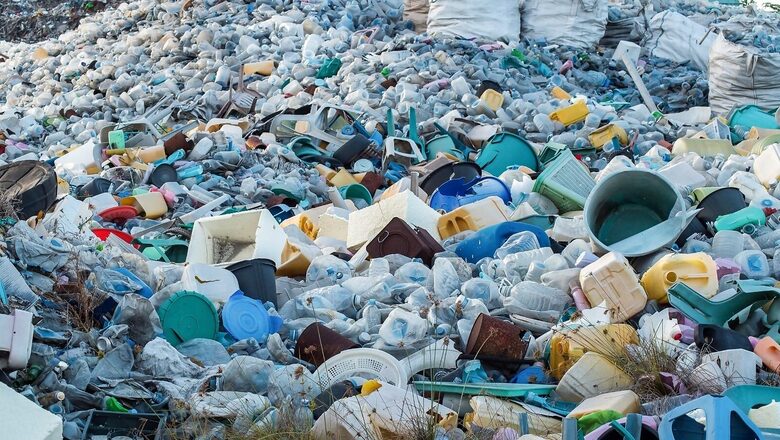
views
Preparations are underway on war-footing as India readies itself for a ban on notified single-use plastic items. While directions have already been issued to all states to curb the supply of banned items, the Central Pollution Control Board (CPCB) has also asked petrochemical industries to stop the supply of plastic raw materials to those engaged in the production of the banned items, starting July 1.
Amid tight domestic supply of raw materials, industries are scurrying for imports to ensure their supply chain continues unhindered.
“We are gearing up to handle the situation,” Mother Dairy MD Manish Bandlish tells News18. “The challenge is that we do not have any local vendor who could help us meet this demand. So like most other companies, we are also compelled to import paper straws, a critical item, at much higher costs. We have already placed the orders, but there are logistical constraints as the same supplier is providing straws to multiple players.”
While most industries have already replaced some of the single-use plastic items such as cutlery and ice-cream sticks, it is the shortage of paper straws that has given them a big jolt. Mother Diary alone consumes over 20 million (2 crore) straws per annum. It is among the several enterprises which has written to the government authorities, including the CPCB, to defer the ban by six months to at least a year. “We are yet to get any response. We can just wait and see. But we will try to manage the best we can,” he adds.
NO STANDARDISATION
In the quest for sustainable and viable alternatives, another challenge that the industry is facing is the lack of standardisation. Industry rues that the Bureau of Indian Standards (BIS) is yet to finalise quality standards for alternatives, their bio-degradability, the process for manufacturing as well as handling of the waste of alternatives such as biopolymers/bioplastics. “The usual process for testing the compostability of alternate molecules takes at least six months, and it is yet to be done. There are no standards or quality checks in place for many of these alternatives, without which no industry can use them as the quantity it needs is huge,” rues Dr Praveen Aggarwal, CEO of industry body Action Alliance for Recycling Beverage Cartons (AARC), which has also sought an additional time of 18 months.
For the packaging industry, the challenge is also to search for a direct alternative to locally available BOPP films (polypropylene) used extensively for packaging products as it prevents moisture and can hold weight better than a cellophane sheet. The notified list of banned items also includes packaging/wrapping plastic films for sweet boxes, cigarette packets and invitation cards.
TOUGH TRANSITION
For small and micro industries, the transition to paper sticks for cotton ear buds is also riddled with difficulties. In the absence of local vendors, the MSME units which have so far imported paper from countries like Finland & Sweden lament that it is putting a financial burden on them. Confectionery giants like Perfetti Van Melle India known for candies and lollipops is importing its paper sticks from Europe.
According to industry representatives, roughly Rs 3.50-crore machinery for manufacturing paper stick has already been imported mostly by medium and large enterprises, and at least Rs 2-crore machines are expected to reach by September. The pandemic-induced restrictions over the last one year further delayed the process. “Some units that have tried to purchase and import the new machinery ended up with a roadblock after China put a ban,” Vinod Kumar, president of India SME Forum tells News18. “Unlike the bigger companies, the smaller units cannot afford to import machinery and alternative items/raw materials at a scale to meet the demand.”
Although some units are in the process of converting/calibrating the higher-end machines to run biodegradable sticks for making cotton buds, Kumar says, many machines cannot be modified. “A staggered ban till January 2023 will give us time to stabilise, and find options for the lowest cost source while remaining competitive,” he implores the government.
The search for alternatives has led stakeholders to explore products made up of compostable/biodegradable plastic, biopolymers, bamboo, paper to even steel. But unlike plastic which offers durability, convenience and unique advantage of insulating products from air-borne germs, the other alternatives have not inspired much confidence. Wood/bamboo can splinter and is susceptible to mildew growth as it can absorb moisture, while paper gets soggy before a drink is finished. “The industry is not against the ban, but just how it is being implemented. While it is up to the industry to figure out the alternatives, there is also a question of availability of raw material, especially for MSMEs which the government need to handhold to make the change,” says Sandip Chhetri, CEO at TradeIndia.com.
TIME TO MANAGE
According to All India Plastics Manufacturers’ Association director-general Deepak Ballani, the focus should also be on stepping up action on proper management of plastic waste, which he terms as the bigger challenge than flow of SUP items. “We also want Clean India and are ready to transition. But why not focus on the root of the problem – plastic waste. We need to improve waste segregation at source level, and amp up our recycling infrastructure,” he says.
As the industry scrambles to procure the alternatives in enough quantities, while still hoping for at least a year’s deferment to the ban, experts highlight that it must shift its attention to other ideas to tide over the current challenge – one of which could be re-designing product packaging.
“The best way to get rid of the plastic waste is to perhaps move towards a different product design, which can eliminate the need for that item. All these SUP items were identified on the basis of their “low utility”, so it is not very difficult for the industry to innovate and experiment with some design changes. If it works, it can help them tide over the problem of dependency on imports,” suggests Siddharth Singh, Programme Manager (environmental governance and waste management) at Delhi-based Centre for Science and Environment.
“It is certain that the world will eventually move to plastic-free alternatives in coming years, and we will have no choice but to adapt, so why not begin now?”
Read all the Latest News , Breaking News , watch Top Videos and Live TV here.



















Comments
0 comment